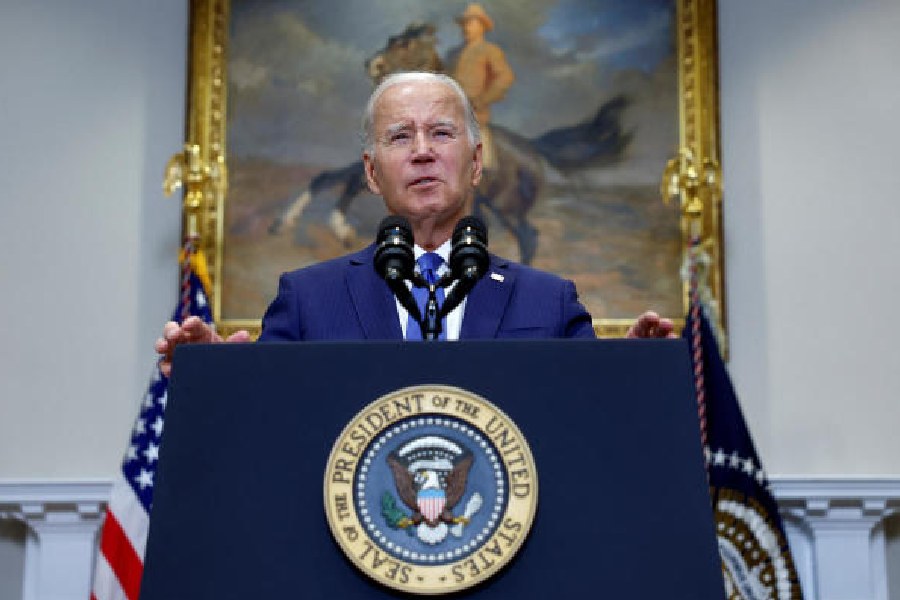The announcement of a prisoner exchange deal between the US and Iran could increase the prospects for further diplomatic cooperation, including the Biden administration’s longstanding goal of containing Iran’s nuclear programme, according to officials and analysts.
While multiple flash points and deep-seated hostilities exist between Washington and Tehran, including Iranian threats to shipping traffic in the Persian Gulf and Iran’s support for Russia’s war in Ukraine, the success of a painstakingly negotiated prisoner agreement removes a severe problem from a relationship that is never far from military confrontation.
Under the deal announced on Thursday, Iran will release five Iranian Americans from custody in return for the freeing of five Iranians jailed in the US, along with the unfreezing of some $6 billion in Iranian assets for humanitarian purposes under strict monitoring.
“The prisoner deal is a key step forward for Washington and Tehran’s efforts to lower tensions as they eye a return to formal nuclear negotiations later this year,” said Henry Rome, a senior fellow at the Washington Institute for Near East Policy.
The deal comes as Iran and the US appear to be observing an informal agreement under which Iran has limited its nuclear programme and restrained proxy militias in Iraq and Syria to avoid harsh American reprisals.
US officials have repeatedly denied that they reached any nuclear “deal” with Iran after indirect talks held in Oman earlier this year. But officials from several countries have described those discussions, and Iran appears to be adhering to an agreement. Its parameters include Iranian enrichment of uranium at purity levels no higher than 60 per cent, and no significant attacks on US troops by Iranian proxy forces in Syria and Iraq.
Two senior Israeli defence officials said the deal involving the prisoners and the frozen funds is part of the broader understandings reached in Oman. These understandings, according to the officials, are already being implemented on the ground. One senior US military official said that there has been decreased activity by Iran-backed militias in Syria and Iraq against US troops there in recent weeks.
Rome said the Biden administration likely hopes that formal nuclear talks organised by the European Union could restart later this year. The negotiations, aimed at restoring the 2015 Iran nuclear deal from which President Donald J. Trump withdrew in 2018, collapsed last summer amid what US officials called unacceptable Iranian demands.
But Rome added the Biden administration was unlikely to want a new nuclear agreement ahead of the 2024 election, given the issue’s political volatility. Iran may feel the same way, given Trump’s possible return to the Oval Office. A key reason talks to restore the nuclear deal failed last year was Tehran’s insistence on guarantees that a future President, perhaps Trump himself, would not renege again on the deal — which the Biden administration could not promise.
The difference between an informal agreement on nuclear issues and a formal one is politically important. A formal deal would likely require approval from the US Congress, where even many Democrats are sceptical of any steps to provide Iran’s repressive authoritarian government with economic and political relief. An informal understanding allows the Biden administration to sidestep Congress, much to the annoyance of many Republicans.
Defusing the slow-boiling crisis around Iran’s nuclear programme, which has expanded in recent years to put Tehran within reach of nuclear weapons capability, is an urgent priority for the Biden administration. President Biden has no desire for a Middle East crisis — one that could be triggered by the United States or an Israeli attack on Iran’s nuclear facilities — as he seeks re-election.
Iranian news media presented the deal as a victory for the conservative administration of President Ebrahim Raisi and called it “honourable diplomacy”. But Iranian analysts said that building on the goodwill of the prisoner exchange to reach broader agreements on Iran’s nuclear and military programmes still remained challenging.
New York Times News Service










